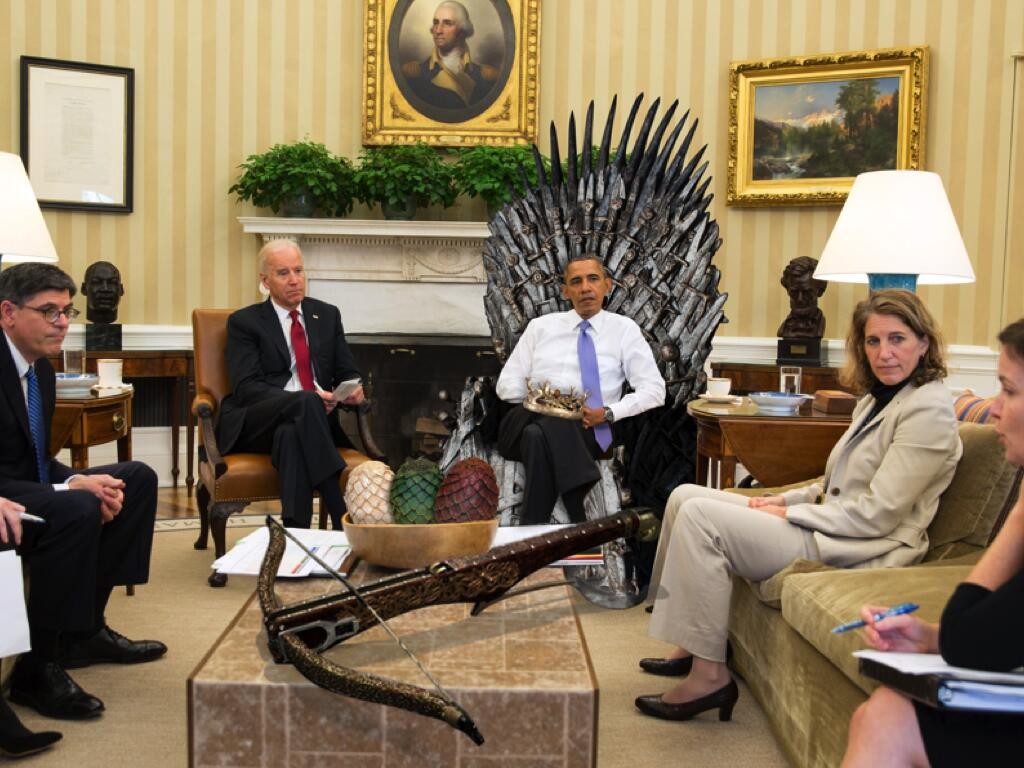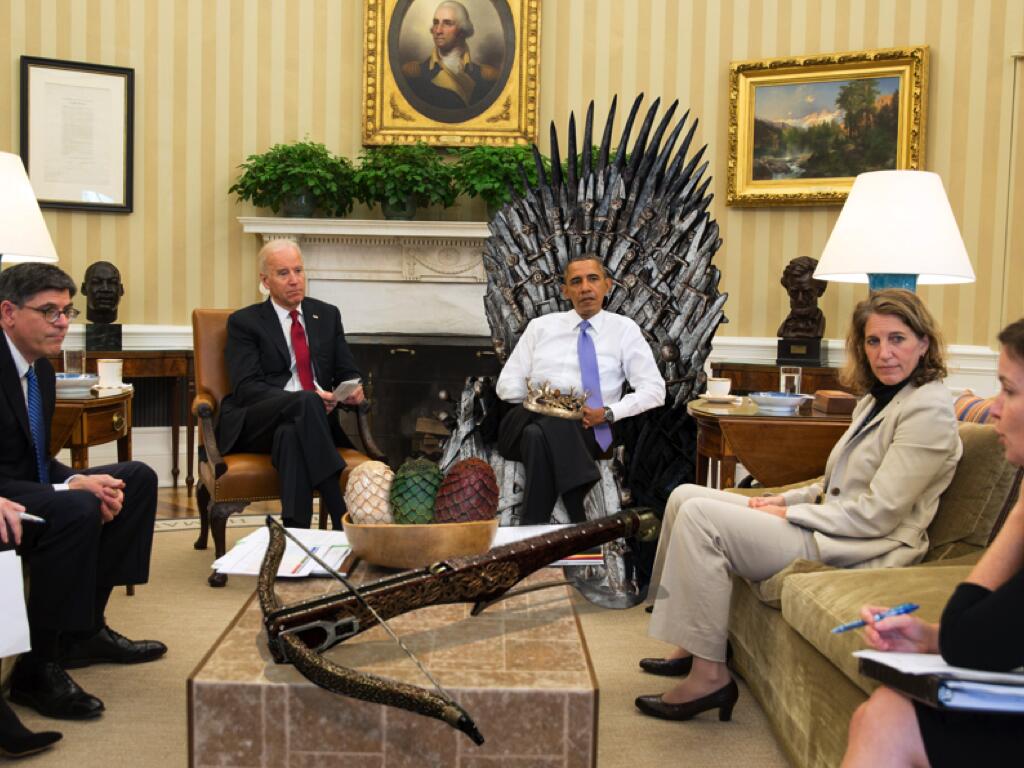
“Shall I explain to you in one easy lesson how the world works?” Tywin Lannister sneers in the final episode of Game of Thrones, season 3. With that, he unloads the most comprehensive summary of the show’s survivalist political intrigue:
“The house that puts family first will always defeat the house that puts the whims and wishes of its sons and daughters first.”
This piece of advice may initially only seem relevant for the scheming lords and ladies of Westeros, the fictional political entity of the show. But by simply replacing “house” with “nation-state” and “family” with “national interests”, the violent and fantasy-laced plots devised for this would-be Medieval realm line up eerily well with the foreign policy of various national governments. While many believe author George R.R. Martin’s fictional world is based on the War of the Roses, and others attempt to match each of the Seven Kingdoms to corresponding countries, few analyses make connections to more contemporary events.
In many ways the foreign policy of Westeros bears resemblance to the roles, perspectives and decisions taken on by the West since the Cold War era. With some imagination, viewers can connect the crises and conflicts in the struggle for the Iron Throne to modern international challenges.
Consider the Red Wedding. When Walder Frey realizes Robb Stark has broken their agreement, he secretly switches allegiances and organizes an ambush massacre at his own daughter’s wedding with Tywin, the Machiavellian head of House Lannister. It may seem unthinkable that a gruesome, underhanded murder would be used to end a war. However, after examining Tywin Lannister’s rhetoric that justifies the attack as a preventive measure, the move echoes a game-changing moment in modern history. Tywin concedes the cruel nature of the attack, but doesn’t recoil from his decision to end the war with the North. In a heated exchange with his son Tyrion, he presents a familiar defense for his actions.
Tyrion: I’m all for cheating. This is war. But to slaughter them at a wedding?
Tywin: Explain to me why it is more noble to kill 10,000 men in battle than a dozen at dinner.
Tyrion: So that’s why you did it? To save lives?
Tywin: To end the war, to protect my family.
Notwithstanding the numbers and the nature of the attack, if “family” is again substituted with “state”, this reflects the language surrounding the American decision to bomb Hiroshima and Nagasaki in order to extract a Japanese surrender in WWII. While the two attacks may not be comparable in magnitude nor impact, the similar justification for both alongside the reactions from their respective “international” communities indicate that they share an underhanded, low blow nature.
Similar and even more recent parallels are peppered throughout the show, whether through actions taken by leaders, crises that befall the realm or the nature of the politics employed and the interactions they create. Below are only a few real-world analogies to GoT plot developments to keep in mind as winter approaches.
Lesson No. 1: Despite norms and agreements, national identities and historical memory will hamper cooperation
The Red Wedding did (temporarily) end the war by quelling the North’s rebellion. But, this was only accomplished at a high human and political cost. In ordering the attack, Tywin cemented himself as an antagonist to the North, a region which must now fall back under King’s Landing’s rule. The sneaky nature of the attack was as much a blow to Northern pride and identity as it was an assassination of their leaders. Tywin defends his decision nonetheless, believing he spared many lives and did what was best for his house.
As a parallel, the most common justification of the atomic bombs in Japan holds that it was the only tactical way to secure an unconditional surrender. On the show, no one outside the Lannisters reference the attack as necessary and merciful. This is why, even two seasons later, characters keep promising that “the North remembers.”
This statement offers curious insight into the way states resume normal relations after a conflict. In fact, it reflects an area of post-modern foreign policy scholarship known as historical memory. How do past acts of aggression, war crimes and genocide affect relations after the peace talks and treaties? Westeros can serve as an interesting political microcosm, with the show documenting the rise and crumble of alliances between the Seven Kingdoms. Because so many dynamics are a consequence of rampant power seeking in the absence of a unifying power, the kingdoms’ interactions can be compared to the post-Cold War power distribution.
Just as in real-world international politics, new arrangements among the kingdoms never happen in a vacuum, but rather are always rooted in (or at the very least weighed against) previous events. Each kingdom has a distinct relationship with and perception of each other kingdom, mostly influenced by a coup d’état to overthrow the Mad King Aerys Targaryen—an event that takes place before the show’s main plot. Many of the interactions the viewer sees have therefore already been conditioned by this distant, past conflict. Part of the intrigue of the show is the viewers’ guesswork in discerning how the events of this shadowy war drive the decisions of each character.
This war, though long over, has had lasting political effects. Because each of the Seven Kingdoms is ruled by its respective “lord paramount” to the realm, these are not entirely sovereign states. They were previously unified through the strength of the Targaryen dynasty, but since the coup, political cohesion among the kingdoms is frequently challenged. National identities developed divergently, and especially in the North’s case, not only are “national interests” at play but also socially and historically-conditioned experiences that have woven themselves into the fabric of each territory’s identity.
The gradual re-fragmentation of the kingdom demonstrates how, when a hegemon falls — particularly one that overshadowed intricate relationships like the various rivalries among the Westerosi houses — the resulting power vacuum allows many smaller-scale conflicts to surface. Are the Lannisters truly in control of Westeros after Robert Boratheon’s death? The North’s rebellion and the subtle dissent of other houses suggest they are not.
In comparison, many question whether the fall of the Soviet Union meant the rise of US hegemony or a multipolar power distribution. No longer worried about belonging to an East, West or third bloc, countries’ internal differences began to surface after the Cold War. Similar to the fall of the Targaryen dynasty, the abrupt end of the bipolar power distribution of the Cold War scrambled the identities of many previously aligned countries. Because the bipolar power structure was so pervasive and all-encompassing, when it finally crumbled, it laid bare numerous internal politics that had been masked and conflicts that had been suppressed. This gave way to an era of intrastate and ethnic conflicts.
Similar to the Seven Kingdoms and the downfall of the Mad King Aerys Targaryen, many persisting barriers to cooperation are offshoots of the Cold War experience. Lingering tensions both within and outside national borders can be explained by the variation in historical memory, whether in the eastern, western or non-aligned blocs.
Lesson No. 2: The excessive use of unreliable weapons can be counterproductive
Identity and historical memory are also shaped by symbols of power. On the show, dragons represent a tool for coercion—in other words, a weapon. The Targaryens’ dragons enabled their ancestors to conquer Westeros and unite the Seven Kingdoms. When their sole surviving heir, Danaerys Targaryen, becomes the “mother of dragons”, she significantly increases her military capacity and even her political authority. But as the dragons mature and she transitions from warrior to ruler, she begins to see how little control she actually exerts over them. By season 4, one dragon begins killing livestock, and later, a child.
This is not unlike the concerning rise in “collateral damage” from drone warfare.
In addition to their power, dragons demonstrate both the temptation and perils of using effective but ultimately imperfect modern weaponry like drones. Take the drone wars in Pakistan. The appeal of drone use comes from its cost effectiveness compared to traditional boots-on-the-ground combat, and from its ability to cleanly take out individuals. But in order to carry out these surgical missions, extremely accurate intelligence is absolutely necessary; most civilian deaths occur when the target is unknown or unidentified. The joint campaigns of the US and Pakistani governments have advanced the fight against terror cells, but at the significant cost of civilian casualties.
Lesson No. 3: Freedom is never imposed
Wielding these dragons as she amasses an army, Danaerys takes viewers through a lesson in “otherness” as she conquers her way across the Eastern continent.
Her crusades against the masters of Slavers’ Bay seem like a noble and justified cause, especially after she witnesses the gruesome acts they committed. Likewise, the democracy-touting neoconservatives of the early 2000s thought that in spreading their model, they would solve the world’s problems. But seen differently, Danaerys is a silver-haired outsider who is using her “liberation” campaign as a political wrench in order to add numbers to her army, which she hopes will one day take back Westeros.
As she upends the entire structural and institutional makeup of these societies, she fails to consider the aftermath of her interventions. Her exchange with Jorah, her guard and counsel, foreshadows some of the trouble she later experiences:
Dany: Perhaps they didn’t want to be conquered.
Jorah: You didn’t conquer them. You liberated them.
Dany: People learn to love their chains.
Later, the aftermath of her liberation in the first slave nation comes back to haunt her. “Without the [armed forces]there to enforce your rule, the Wise Masters have retaken control of the city,” she is informed. “They’ve re-enslaved the freed men who stayed behind and swore to take revenge against you. And in Astapor, the council you installed to rule the city has been overthrown by a butcher named Cleon, who’s declared himself ‘His Imperial Majesty.’” Realizing her liberations have created instability, she decides to impose her own system of law and order.
Slowly, she begins to see her liberation project unravel after failing to account for internal political complexities. Not all the slaves are better off than before her invasion; many are now homeless and jobless. In addition, the elite masters she ousted have mobilized into a group of violent extremists, the Sons of the Harpy, with growing legitimacy.
In these crusade-like interventions, Danaerys embodies the turn of the century neoconservative sextant of promoting democracy around the world without understanding that when it comes to governance, one size doesn’t fit all. As she, like the neoconservatives, disrupts the fabric of society, she lacks the understanding necessary for creating sustainable peace tailored to the lands she invades.
In a real-world parallel, once it became clear Saddam Hussein did not possess WMD, the mission of operation Iraqi Freedom turned to establishing democratic rule. In a costly and drawn out war, the US overlooked factors like religion, ethnic divides and arbitrary borders that made its brand of democracy impossible to achieve in that state.
Danaerys’s experiences can teach developed countries with policing aspirations that no matter how well-intentioned the intervention, political institutions must be tailored to the local environment. Furthermore, as development economist William Easterly says, freedom cannot come from the outside; otherwise, it wouldn’t be freedom.
What’s Next for Westeros?
Westerosi “foreign policy” is in a period of transition, much like the international system after the dissolution of the Soviet Union. The creation of power vacuums, both on the Eastern and Western continents on the show, have led to destabilization as multiple poles vie for control of the Iron Throne.
This dynamic, though not completely analogous to post-Cold War international politics, at the very least loosely resembles Samuel Huntington’s Clash of Civilizations. In this theory, though the state remains the main political actor, conflict will be driven by fundamental ideological differences. “Civilization identity will be increasingly important in the future,” he says in his book, “and the world will be shaped in large measure by the interactions among seven or eight major civilizations.”
Many other ties exist in the show. What if the constant reminders of winter’s impending arrival were actually signaling a dangerous rise in temperatures due to greenhouse gases trapped in the atmosphere? The sorry state of the Night’s Watch and the little attention that is paid to the ever-worsening situation north of The Wall demonstrate the challenges of negotiating an issue with intangible or long-term effects, i.e., climate change. In addition, the influx of Wildling people attempting to move south to escape the white walker army could well result in a refugee crisis.
And Season 6 could unleash an entirely new set of foreign policy lessons.
The views expressed by the author do not necessarily reflect those of the Glimpse from the Globe staff, editors or governors.







